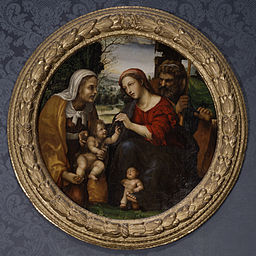Elizabeth…and the First Christological Confession of Faith

Elizabeth’s story (Read Luke 1)
We hear a great deal about Jesus this time of year. But Advent is about preparing the way for Jesus, and no one did that better than John the Baptist this time of year–and it all started with his mother, Elizabeth. What do we know about her? Consider her story…
——————-
An older woman, Elizabeth is married to a priest named Zechariah—and the couple’s only regret is that they are childless, apparently infertile.
Both Zechariah and Elizabeth are from the line of Aaron, the traditional order of priests within Israel. By lot, Zechariah is chosen one day for the high honor of burning incense at the altar in the temple at Jerusalem in preparation for the sacrifice of a spotless lamb on behalf of the nation.
Luke does not say where Elizabeth is when Zechariah disappears into the inner sanctum. She may be in the Court of Women, praying. She might be at home making dinner, sewing vestments, or resting. Little does she, or anyone else, know that her husband is about to have the surprise of his life —for in that smoky space emerges God’s holy messenger, Gabriel.
Imagine the flourish, and Zechariah’s surprise, when Gabriel appeared. He most likely suspects that the form is a heavenly being, but knows no more.
The angel is blunt.
“Your wife will bear a child,” says Gabriel.
Zechariah stands speechless. Such a thought has been his lifelong dream, but who is this creature?
“His name will be John, and he will point his people to the Lord their God. You shall raise him as one set apart by God. He will be a holy man.
The priest does not believe what he is hearing, and had much the same reaction that Abraham did when God’s messengers said that Sarah would bear a child in her old age.
“I am an old man,” he protests, “and my wife is getting on in years!”
“Fine,” says Gabriel. “Don’t believe me. I’m making you mute until after the baby is born because of your unbelief. That way you won’t have any trouble keeping your thoughts to yourself.”
Despite being in God’s penalty zone, Zechariah is able to communicate to Elizabeth the good news: that they will be parents. Elizabeth, God bless her (and this is probably why God chose her), rejoices without question, in full trust.
Several months later, she hears a knock at her door: it is her cousin, young Mary of Nazareth, breathless because of the long trek. Fleeing from her home, she has gone “with haste” to see Elizabeth. Upon hearing Mary’s voice, baby John leaps in Elizabeth’s womb—and instantly Elizabeth understands.
“Blessed are you among women, and blessed is the fruit of your womb!” cries Elizabeth. “And why has this happened, that the mother of my Lord comes to me?”
Imagine Mary’s joy. Finally she is with someone who rejoices in her pregnancy and understands her pregnancy not as problematic, but as good, sacred, holy. So content is Mary that she recites the Magnificat, a glorious spoken hymn praising God. And then she stays with Elizabeth for three months, no doubt a time of both rejoicing and sharing for both mothers-to- be: one young, one old.
When John is eight days of age, his parents bring him to the temple for the traditional rite of circumcision. Those gathered round begin to name the child Zechariah, after his father.
Elizabeth speaks up, saying: “No; he is to be called John.” But her word is not enough; they check with Zechariah, still mute. Grabbing for a tablet, he confirms her statement, writing, “His name is John.”
Later known as John the Baptist, their son would spend his adult life preparing the way for his cousin Jesus: baptizing, teaching and preaching. In his early ‘30s, he was beheaded for criticizing Herod.
One hopes his mother and father had passed away by then.
Consider…
Imagine the surprise Elizabeth felt when she opened her door to find Mary on her doorstep. Unlike Sarah, who laughed skeptically when she was told she would bear a child in old age, Elizabeth rejoiced in the whole process: hearing the news, anticipating the birth, and sharing in Mary’s joy.
And imagine the thump in her stomach as baby John leaped in her womb upon hearing Mary’s voice. Called to prepare the way of Jesus, his work had already started.
Over thirty years later, Jesus would ask Simon Peter, “…who do you say that I am?” Peter would answer, “You are the Messiah, the Son of the living God” (Matthew 16:15-16; Luke 9:20). The woman at the well would ask almost the same thing: “Come, see a man who told me all that I ever did. Can this be the Christ?” (John 4:29)
This, then, is the earliest confession in the New Testament—initiated by wee John and spoken by Elizabeth: “Blessed are you among women, and blessed is the fruit of your womb…the mother of my Lord comes to me…!”
We do not know anything of John’s childhood, other than he was raised a nazarite: one commissioned by God for a sacred role. But we do know this: his mother loved him dearly, and was delighted to be such a key part of God’s unfolding plan.
What might we learn from Elizabeth?
Calls to serve God can come at any age.
Patience can be rewarding; miracles can happen.
Virtues such as faith, joy and bravery can indeed be passed onto a child.

